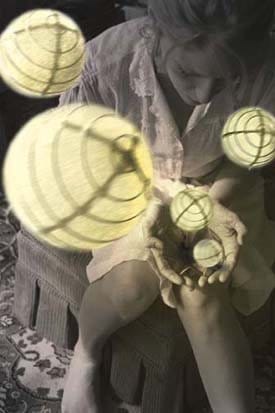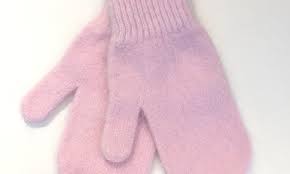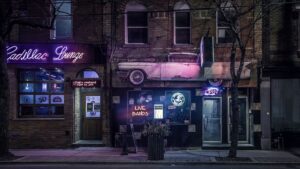by
Tricia McCallum
I’ve been losing things lately. Nothing major, just broaches off jacket lapels and hairclips, that sort of thing. Things that I get mad at myself for losing, mad that I spent money on in the first place. I don’t even realize they’re missing until something reminds me. Last week I noticed a girl in line at the supermarket wearing a delicate silver pin in the shape of a hummingbird. I suddenly remembered I used to have one almost identical.
My therapist tells me this points to something else. With Dr. Jamieson, nothing can be just what it is. He says my misplacing things is a subconscious attempt to reshape my life. He may have something there. I mean, look at what he’s working with -a 28- year-old woman who dropped out of med school halfway through because her hair was falling out in clumps and who now manages a rundown movie theatre on Queen Street.
“Have you ever wondered why you won’t allow yourself to succeed, Abby?” he once asked, studying me like I was a smear on a glass slide. I told him I could ask myself questions like that. What I was paying him for were answers.
“Only you have the answers, Abby,” he said lightly. “I’m simply here to help you find them.”
My friend Lydia recommended that I go to see him. She was worried about me. I’d been spending up to 48 hours at a stretch in bed and living on animal crackers and Coke since I discovered that my boyfriend Jack was married and had a little girl named Emily. I had accidentally run into him two weeks before at the Eaton Centre. I was walking by Collegiate Sports and spotted him browsing. It was a Tuesday afternoon and I was surprised to see him in town during the week. He was a pilot for Air Canada, always flying off somewhere exotic, and I rarely saw him except on weekends.
“Guess who,” I squealed, coming up behind him. He wheeled around and at first looked as if he didn’t recognize me. ” Abby. Aren’t you working today?” He sounded accusatory.
“Mental health day. Don’t count me in,” I said lightly. “What are you doing in town?”
“Checking up on me?” he asked. He seemed annoyed, not quite himself.
“What’s wrong, Jack?” I asked, concerned. “What is it?” Before he could answer a nondescript blond woman carrying a toddler walked toward us. She was motioning impatiently to him.
“Honey, didn’t you hear me calling you?” she shouted. “Come and look at these skis. They’re a fantastic price.”
I stood motionless, numbed. As she approached us Jack reached out to her, quickly took the child from her arms, and turned away from me without a word. As they walked down the aisle, the woman looked back at me and I heard her ask Jack who I was. “Oh, just one of our flight attendants,” he said.
There were lots of things I could have done but I didn’t do any of them. Detached, I stood there watching them, a family out shopping for the day. I remember thinking that I never even knew Jack was a skier. I left the store, went home and stayed in bed for two days straight. Jack called several times and left messages an my machine, distraught nonsense about giving him a chance to explain, that he had only stayed in the marriage because of Emily, but I never called him back. I couldn’t see the point. As I told Lydia, I’m not a complete idiot.
“You’re clinically depressed,” Lydia shouts from the kitchen, stacking dirty dishes. It is two in the afternoon and I am buried under a mound of covers watching a rerun of “I Dream of Jeannie.” Jeannie has just materialized on Major Nelson’s lap during a meeting at NASA. Nelson is doing his best to ignore her.
” At least make an appointment, Abby,” she says in her motherly tone, stacking up my dirty dishes. “It will help, believe me.” Lydia has been seeing Dr. Jamieson since suffering from post-partum depression last year. She swears he saved her life.
It takes me a full two hours to get ready for the appointment. Simple things seem monumental when you’re down. Standing waiting for the subway, I remember a story I read once about a depressed man who spent a whole morning trying to decide which shirt to wear. Because he couldn’t make up his mind he decided not to go out at all.
Dr. Jamieson’s offices are on the 2Oth floor of a corporate tower at King and Bay. The atmosphere when I step off the elevator is sterile, almost air tight. In the room where the nurse has asked me to wait, one wall is constructed entirely of chunky, pale green glass blocks. I stand in front of them, peering, trying to piece together my milky reflection. A mustard-coloured leather couch lies along another wall. It doesn’t strike me as the kind of room where people strip bare their souls, more like a place where business executives strike high-powered deals while holding cellular phones.
When Dr. Jamieson walks through the door, I’m surprised. From the way Lydia talked about him I’d expected him to be the five-piece business suit type. Instead, he seems not much older than me and is dressed casually in a Shetland wool sweater and tan cords. He looks expectant.
“You are not seeing me at my best,” I tell him unapologetically. I want to establish this up front.
“I’m sure of that, Abby,” he says gently, settling into a leather chair across from me, the same colour as the couch. “First, why don’t you tell me why you are here?”
“Do you mind if I smoke?” I ask. No matter how bad things are, I never forget my manners. He shakes his head strenuously and hands me a cut glass ashtray. I spend the next hour chain-smoking and trying to answer his question. He doesn’t interrupt: he just nods from time to time and jots notes in a small bound book on his lap. This could grow on me, I think.
When our time is up, he says, ” Abby, you have to choose the life you want and then make that life happen. We’ll look at the necessary steps next time.” The way he says it, it sounds straightforward and entirely possible. Meanwhile he advises me to take a long walk every day and start eating better. Lydia was right about one thing. He has a soothing effect, like slices of cucumber on tired eyes. At seventy-five dollars a crack, I can barely afford him but he may just be worth it.
I walk out of his office feeling optimistic for the first time in weeks. This is just what I needed, I think, someone to say, Now, this is what we are going to do, the way I had done with my mother. One week she’d be on a manic high, feeling such joy it seemed she could barely contain it. The next week I’d find her in her room, inert and sullen, the shades drawn, the room reeking of rye. The “mean reds” she had called them, dark moods that worsened as she got older. My father was on the road selling most of the time. When he was at home, he was distant and complacent, the kind of man who said things like “You make your bed, you lie in it.” I guess that’s why he never left her, even though I sometimes prayed he would.
Two weeks have passed since I saw Jamieson. I’m taking it a day at a time, just like he said. We’re running a Marx Brothers double bill at the Ritz. M y cashier has the flu and I am filling in at the ticket booth. A man who looks a little like Harrison Ford pushes a bill through the slot. I study him through the glass partition. He’s wearing a t-shirt that reads: Make Things Happen.
“What kinds of things?” I quiz him. I’ve always been suspicious of people who wear printed slogans on their chests.
He digs his hands into his pockets. “Whatever you want to hap pen,” he says airily. I was soon to learn this man could make the simplest things sound profound.
“My therapist would love you,” I whisper, watching him walk toward the candy counter.
After the final credits roll he knocks on the door of my office and peeks his head in. He is polishing off the last of a Crispy Crunch and looks relaxed, as if there is nowhere he has to be. “Do you like espresso?” he asks pointedly, sounding like he cares deeply about how I answer.
“No, I’m strictly a Maxwell House kid,” I say, too loud. Ever since Jack I have developed the habit of raising my voice whenever I talk to men.
“That can be arranged,” he says, gesturing gallantly toward the front door.
He helps me lock up and we head down the block to the corner restaurant. We settle into a booth and he orders chocolate cheese- cake. His name is Ben, short for Bennett, his mother’s maiden name. I like the way he talks to the waitress: one of my arbitrary tests of a man’s character is how he addresses the help. When he tells me he is a lumberjack I laugh, not realizing they still existed. He looks the part all right, all chest and shoulders, but there is a softness in him. I had him figured for a landscaper maybe, or a zookeeper. Until the year before, he taught at a community college but finally got so fed up with academia he chucked it and headed up north to a job in a logging camp.
“1 love it up there,” Ben says, ordering a third round of coffee, “no office politics or hidden agendas. I know exactly what is expected of me.”
“You created the life you wanted,” I say, studying his eye- brows.
He shrugs. “1 just figure life isn’t a dress rehearsal.” I ask him wasn’t that one of Cher’s lines and he laughs loudly. “Yeah, but I said it first.”
“It’s not so much that I don’t know what I want but that every- one else seems to,” I say wistfully. This is one man who doesn’t make me feel I have something to prove.
“Maybe you just never wanted anything enough,” he says matter-of-factly. The man gives me credit. I can’t help thinking that this is going too well.
Hours later we are sprawled on my couch filling each other in on details of our lives. “It reads like a bad novel,” I confide to him, explaining about Jack. “People ask me how I could not possibly have known. He had this whole other life and I was completely clued out.”
“You trusted, Abby. Give yourself a break.” Paul Bunyan lives, I think, wanting to stroke the hairs on his bulky forearm. I learn that he was married once, until he found out his wife was having an affair with her boss. We agree the parallels between us are startling. I tell him I feel like I’m talking to my brother, if I had one.
~~~~~~~
Ben works up north five days a week and flies down to see me every other weekend. We sit in downtown clubs talking for hours, share long hot baths while Nat King Cole plays on the turntable, and read to each other from the weekend newspapers. I’m a past master at this part-time stuff.
It’s late one Sunday morning and I am still in bed. Ben’s been up for hours: he set the alarm because he said he wanted to see Venus in the east. He is sitting on the bed reading aloud from the Globe about some survey on single women. “It says here if women aren’t married by the time they’re 30, they’ve only got a ten per cent chance of ever snagging anyone.” He knows this will bug the hell out of me and I am already in a foul mood. I’ve always hated Sundays, a day when nothing seems possible. It reminds me of my childhood and being stuffed into church pews, everything in our small town shut tight and school looming the next day.
“Those interested in that sort of thing best get busy then,” I growl, pulling the covers tighter. He slips under the sheets, still with his jeans on, and I can feel the hard cold denim against the back of my legs. He sighs melodramatically and snuggles closer. “Why is it the great women never want what the ordinary ones do?” “How is Venus?” I ask, casually changing the subject. ” A beacon,” he says reverently, and we both drift off to sleep.
“I love him, Doctor. So much my teeth hurt.” This is an old Rosalind Russell line and I’m finally getting a chance to use it. It’s Monday afternoon and I’m stretched out on Jamieson’s couch. Ben flew back to North Bay a few hours ago. “But I feel a show- down coming. How long before he wants to drag me back to his cave by my hair?” That’s the great thing about psychiatrists: You don’t have to worry how neurotic you sound.
“Ben is not Jack, Abby,” he says quietly, wiping his glasses with a special lint-free cloth. “No matter how hard you try and make it so.” Stop making sense, I think. Stop it.
Business is slow at the Ritz: our Ingmar Bergman Festival has turned out to be a complete dud. “Does it have to come out of Burbank before people will pay to see it?” I complain to Lydia. We’re haying hot chocolate and Peak Freans while Hannah, her two-year old, tears fistfuls of pages out of the Sears catalogue.
” Abby, it’s February,” she declares, fiddling with her French braid. “There’s a recession. I mean, really, Bergman? Who needs to be more depressed?”
I detest her logic because I realize she’s right. “For God’s sake, Lydia, don’t you start questioning my judgement. That’s what I pay Jamieson for.”
~~~~~~
Ben wants me to move up north with him. He announces this on a Saturday afternoon while we’re in the bath, up to our necks in Mr. Bubble. Nat is crooning ” Autumn Leaves” on the stereo. I was afraid of this. I dump a spongeful of soapy water onto my chest before saying anything.
“That’s your life I’d be living, Ben, not mine. I’m not the Little House on the Prairie type: I’m the CNN, let’s order pizza, sleep till noon type.” I try to sound flip but realize this is what Dr. Jamieson will later call a pivotal conversation.
“It could be our life,” he says, and the way he looks at me I’m almost convinced. “We could get you a satellite dish.” I picture Ben’s tiny cabin in the woods dwarfed by a monstrous orb of black wire mesh.
I sit up in the tub and start to shiver. “The outback, or Yonge and Dundas. Why are my choices always worlds apart? Don’t make me decide now, Ben.”
“Not deciding is deciding,” he says flatly, toweling off.
It’s March, one of the coldest on record. The streets of Toronto are lined with banks of crusty gray sludge. Lydia is visiting, diapering Hannah on my sofa bed.
“I simply can’t imagine my life without my husband and baby,” Lydia says. “What did I do with myself before?” She sounds smug and slightly mystified. You did what we all do, I think, picking Hannah up for a cuddle. You looked for something solid, someone you could count on. And when you found it, prayed that you wouldn’t let yourself lose it.
I remember the day I got the letter saying I’d been accepted to med school. My mother was sitting at the kitchen table in her nightgown drinking coffee. Her doctor had been trying out different medications in an attempt to lift her melancholy but nothing seemed to be helping.
“Mom, the best news!” I said, pirouetting around the table waving the letter. “I got in.” She said nothing, just tapped her cigarette methodically against the ashtray. Then she looked up at me, her face full of the sorrow I’d come to recognize.
” And who’s going to be there for me, Abby? They don’t need you,” she said, making a sweeping motion that took in all of the outdoors. “But I do.” Just once I wanted to talk to her about what I needed, the way other daughters must have done with their mothers, but had learned long ago what was possible.
My mother died the following year. She went to bed early one night, complaining that she didn’t feel well. The doctor told me she just stopped breathing in her sleep. Sorting through her things afterwards I found a notebook in her bedside table. I read through it expectantly, not knowing what I hoped to find, maybe an answer of some kind, a clue to the dreams she might have once had for her life. Most of the entries were the drunken ramblings I’d heard so many times. But on one page, written on one of her better days, she’d entered the same phrase neatly, over and over again, the way kids were forced to do on blackboards at school as punishment. The four words were: Try to be happy.
~~~~~~
It’s Theme Month at the Ritz: this week it’s Island Romance. The lobby is decorated with papier-mâché sand dunes and two fake palm trees I bought from a movie production house. “Blue Lagoon” with Brooke Shields is packing them in. I’ve given up trying to figure out the buying public. They’re lined up for miles it seems, in neon shorts and tank tops. The couple at the front of the line has matching Perrier bottles in cloth satchels hanging from their belt buckles. My cashier is sick again and I punch out ticket after ticket. I’m envisioning my appointment with Dr. Jamieson the next day. I picture it perfectly.
I keep losing things, I’ll announce. He’ll weigh this while thoughtfully stroking his perfectly groomed beard. Then he’ll ask the big one. “Why won’t you allow yourself to be happy, Abby?”
I’ll look at him for the longest time, at the degrees on his wall and the designer armchairs flanking his plexiglass desk. I’ll wonder why I pay him seventy-five lousy bucks an hour when all he can do is ask questions which have no answers.
This story appeared in Quarry, a Canadian literary journal, in the spring of 1992.










